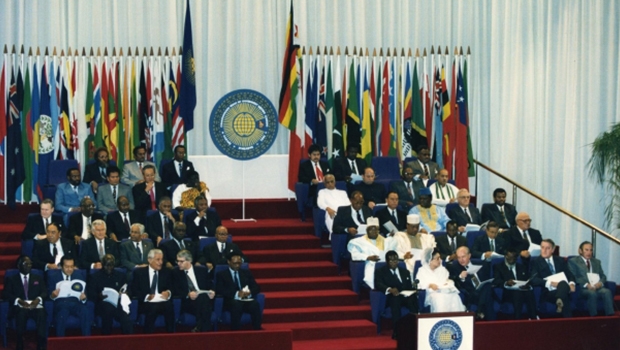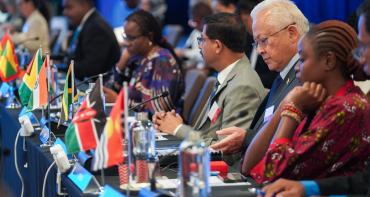
Ottawa Declaration on Women and Structural Adjustment
Ottawa, Canada, 1991
We, the Heads of Government of the Commonwealth, believe that the challenges created by the changing world economic environment must be met through sound, equitable and effective adjustment policies at both national and international levels. These policies are vital for achieving the non-inflationary economic growth and sustainable development necessary to enhance human well-being. We endorse the broader approach to adjustment set out in the Commonwealth Expert Group’s Report, Engendering Adjustment for the 1990s, including its three general principles of an emphasis on social equity and economic growth as well as efficiency; full integration of women into the decision-making processes; and a supportive international environment.
We appreciate the determined efforts being made by many governments, inside and outside the Commonwealth, to reform both policies and institutions. Moves towards the creation of a more supportive global economic environment are also greatly valued. But we accept too that much more needs to be done if women are to regain the advances they lost in the 1980s partly as a result of inappropriate structural adjustment policies.
We are convinced that it is both essential and possible to design and implement policies and programmes that will improve the effectiveness, acceptability and sustainability of adjustment efforts. Structural adjustment cannot be sustained, development will be limited and the costs of adjustment will continue to be borne disproportionately by women unless such policies and programmes fully integrate measures to ensure gender equity, greater concern for basic human needs and protection of the physical environment, and are adequately financed.
The full potential of the development process can only be reached if its economic and social aspects, including poverty reduction, are recognised as mutually supportive. It is especially important that programmes in primary health care, nutrition, family planning and education and training are not impaired. Greater advances for women in these areas must be maintained. Investment in the nutrition, health and education of a country’s population is as crucial to the development of its economy and the well-being of its people as is any investment in physical capital.
The structural adjustment process provides important opportunities to re-evaluate the ways in which women and men from all parts of society can best contribute to and benefit from economic and social development. As compared to men, there are considerably more complex demands on women’s time from their multiple roles as economic producers, mothers and caregivers, household managers and community organisers.
Adjustment programmes must be designed to ensure a more equitable sharing between women and men not only of the programmes’ costs but also of the rewards and benefits accruing. It is only in this way that women’s active participation and wide-ranging contributions to the economy - too often unrecognised because unpaid - can be brought into the process.
Therefore, we commit our governments and commend to others the following programme of action:
- To reform social, administrative and legal structures to give women full and effective rights to land, finance and other resources. Such reforms will remove barriers to women’s ability to participate in, contribute to and benefit from productive activity in a market economy.
- To invest in enhancing women’s productive activities, especially in key areas such as enterprise development, agricultural production and food security. Improved access to appropriate technologies, extension services, transportation and training can increase productivity for women’s own benefit and that of the economy as a whole.
- To ensure that incentives to participate in new opportunities and growth sectors do reach women, and that market structures are created which are as open to women as they are to men. Particular support will be provided where necessary to enable women to take advantage of more open and competitive markets, including greater access to and more flexible and innovative terms of credit.
- To ensure that public policy and expenditures are conducive to the provision of basic goods and services to support women’s multiple activities. Increased public expenditure on nutrition, education and health programmes that support women is vital in ensuring they have time to make use of new productive capacity and respond to new market incentives. This is necessary for long-run human resource development. A particular priority is to increase access to schooling for girls. This will have positive effects on child health and survival, population growth rates, family well-being and economic productivity. Such emphases must be embodied in programmes that are accountable to women and responsive to their needs.
- To integrate women’s interests more consistently into public policy, including the design and implementation of structural adjustment policies, through: increasing gender awareness throughout government; ensuring the full involvement of women in decision-making and operational processes at all levels; enhancing the capacity of women’s bureaux to contribute effectively to economic analysis and project appraisal; encouraging effective channels for women and women’s organisations to express their perspectives and concerns; and establishing steering committees within Ministries of Finance to ensure that gender issues are incorporated into all decisions relating to structural adjustment.
- To improve the collection of data - quantitative and qualitative - and the development of methods and statistical indicators, globally and nationally, that could provide a better understanding of the economic activity of both women and men, and the consequent impact by gender of specific policies, paying particular attention to the possibility of differential impacts within households.
- To encourage the international organisations of which we are members to join us in our endeavour to fully integrate the goal of equity between women and men in the structural adjustment process, to ensure that structural adjustment programmes are growth oriented, more long term, better financed, take account of measures necessary to ameliorate negative social impact, and, in all other ways, including improving market access for developing country exports and increasing external resource flows, to promote a more favourable international economic environment.
Submitted by the Third Meeting of Commonwealth Ministers Responsible for ‘Women’s Affairs, Ottawa, Canada, 9-12 October 1990.
Issued at the Commonwealth Heads of Government Meeting, Harare, Zimbabwe, 16 – 21 October 1991.



